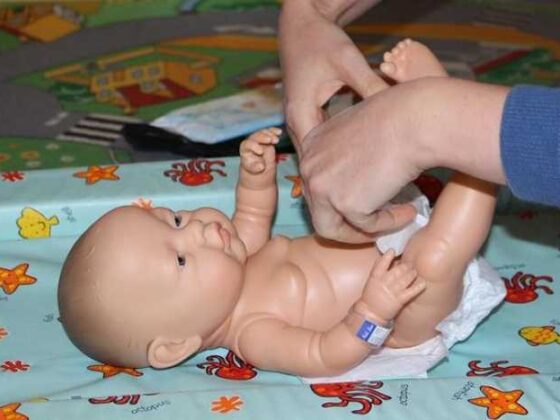Becoming a new parent is an exciting adventure-filled with joy, sleepless nights, and a whole lot of learning on the fly. If you’re staring down the adorable little bundle in your arms and wondering where on earth to start with baby training, you’re not alone. From establishing sleep routines to tackling those first feeding challenges, getting into a groove early can make all the difference (for you and your baby!). In this post, we’re breaking down the baby training basics every new parent should know-no jargon, no pressure, just real-talk tips to help you feel a little more confident as you navigate this wild, wonderful journey. Let’s dive in!
Getting Started with baby Training: Setting realistic Expectations
Before diving into the world of baby training, it’s essential to understand that every child develops on their own timeline. Setting realistic goals helps reduce frustration and keeps both you and your baby happy throughout the learning journey.Remember, what works for one baby might not work for another, so flexibility and patience are your best tools. Celebrate small victories like a triumphant nap or the first time your little one holds a spoon – these moments are milestones worth applauding!
Here are a few things to keep in mind as you start training your baby:
- consistency trumps perfection. Routine helps babies feel secure, but don’t stress if days don’t go exactly as planned.
- Expect inevitable setbacks. Growth isn’t linear; your baby might take two steps forward and one step back.
- Enjoy quality bonding time. Training is also about connection, not just skills.
| Training Aspect | Realistic Expectation | Helpful Tip |
|---|---|---|
| Sleep Habits | Irregular at first | Focus on establishing a bedtime routine |
| Feeding | Messy but improving | Introduce new foods gradually |
| Potty Training | Will take time & patience | Look for signs of readiness |
Mastering Sleep Routines That Actually Work for You and Your Baby
Establishing a sleep routine that fits both you and your baby is less about rigidity and more about consistency paired with flexibility. Babies thrive on predictability,but every little one has their own rhythm. Start by tuning into your baby’s sleepy cues-yawning, rubbing eyes, or fussiness-and aim to put them down before overtiredness sets in. Consistency in timing creates a comforting sleep environment, but adapting to your baby’s evolving needs helps avoid needless stress for both of you. Key elements to focus on include:
- Dim lighting and soft sounds to signal winding down
- A calming pre-sleep ritual, like reading or singing
- Creating a cozy, safe sleep space adjusted to baby’s preferences
- Responding gently rather than rushing in at every sound
To keep things manageable, organizing your baby’s sleep expectations alongside your own can make a real difference.Use simple tracking tools like a sleep log or chart to spot patterns and adjust accordingly. Adding a little structure helps avoid the “guesswork game” during those groggy night hours.Here’s a rapid look at a typical sleep schedule that can be tailored depending on your baby’s age:
| Age | Nap Frequency | Average Night Sleep |
|---|---|---|
| 0-3 months | 4-6 naps | 8-9 hours (with wakings) |
| 4-6 months | 3-4 naps | 10-11 hours (more consolidated) |
| 7-12 months | 2-3 naps | 11-12 hours (mostly uninterrupted) |

Feeding Tips to Keep Your Little One Happy and Healthy
Establishing a consistent feeding routine helps your baby feel secure and satisfied. Remember to offer breast milk or formula on demand during the first months-it’s perfectly okay if your little one wants to nurse more frequently.As they grow, introducing solid foods one at a time can ensure you spot any allergies early. Keep meals colorful and fun by adding pureed vegetables and fruits, and don’t stress about small messes; they’re part of the learning process!
Pay attention to hunger and fullness cues, like turning their head away or closing their mouth, which are just as important as watchful feeding schedules. Adding mealtime routines can foster positive associations-try singing a gentle song or using the same spoon and bowl each day. Below is a simple guide to help you track your baby’s feeding stages with ease:
| Age | Feeding Focus | Examples |
|---|---|---|
| 0-6 Months | Milk (Breast or Formula) | On demand, 8-12 times/day |
| 6-8 Months | Introduction of solids | Pureed fruits, veggies, rice cereal |
| 8-12 Months | Varied textures | Mash foods, soft finger foods |
Crying It Out or Holding On: Finding Your Perfect Soothing Strategy
When it comes to soothing your little one, there’s no one-size-fits-all solution. Some parents swear by the “cry it out” method to help babies learn self-soothing skills, while others prefer to hold on tight, offering comfort and reassurance at every whimper or fuss.the truth is, your perfect strategy may lie somewhere in between. It’s all about tuning into your baby’s unique temperament and your own comfort level. Never underestimate the power of patience and consistency-whether you decide to let the tears flow or swoop in for cuddles, your love and presence are the real game-changers.
- Observe your baby’s signals: Is their crying stemming from discomfort, tiredness, or a need for connection?
- Set realistic expectations for both you and your baby; no method works overnight.
- Mix and match techniques-sometimes a gentle pat and other times a little space can work wonders.
| Soothing Method | Best For | Parent’s role |
|---|---|---|
| Crying It Out | Building sleep independence | Consistent timing, minimal intervention |
| Holding On | Emotional bonding and reassurance | Immediate response, lots of cuddles |
| Hybrid Approach | Balancing sleep and comfort | Responsive but gradual withdrawal |
Q&A
Q&A: Baby Training Basics – Tips Every New Parent Should Know
Q: What exactly is “baby training”?
A: Great question! Baby training isn’t about strict schedules or drills-it’s more about gently helping your little one get used to everyday routines like sleeping, eating, and potty time.Think of it as guiding your baby’s natural rhythm while making life a bit easier for everyone.
Q: When should I start training my baby?
A: Every baby is different, but generally, you can start introducing simple routines around 6 to 8 weeks old. It’s all about being flexible and watching how your baby responds. Don’t stress about starting too early or late-go with the flow!
Q: How do I create a sleep routine for my baby?
A: Consistency is key! Try putting your baby down for naps and bedtime around the same times each day. create a calming pre-sleep ritual, like a warm bath or a gentle lullaby. And remember: falling asleep independently is a skill they’ll pick up gradually.
Q: What about feeding schedules? Should I time their meals?
A: For newborns, it’s best to feed on demand-that means whenever your baby is hungry.As they grow older (around 3-4 months), you can start encouraging more predictable feeding times. This helps both of you get into a groove, but don’t worry if it takes time to figure out.
Q: How can I get my baby interested in potty training?
A: Potty training usually starts later-anywhere between 18 months to 3 years-but you can prep early by talking about it, reading potty-themed books, and letting them watch you go to the bathroom (kids are curious like that!). When they show signs of readiness,like staying dry for a couple of hours or telling you when they need to go,you can begin the fun process.
Q: What if my baby resists the routine?
A: Totally normal! babies are little humans with moods and needs. If your baby pushes back, try switching things up a bit, keeping routines flexible, and offering comfort. Patience and love go a long way.
Q: Any quick tip for new parents feeling overwhelmed?
A: Take a deep breath and don’t aim for perfection. Baby training is about progress, not perfection. Celebrate small wins, ask for help, and remember-you’re doing an amazing job!
closing Remarks
And there you have it-baby training basics made simple! Remember, every little one is unique, so don’t stress if things don’t go perfectly right away. Patience, consistency, and a good sense of humor are your best friends on this parenting journey. Keep these tips in your back pocket, trust your instincts, and enjoy those precious moments (and occasional messes) along the way. You’ve got this, super parent! Stay tuned for more tips and tricks to make parenting just a bit easier. Until next time, happy parenting!











